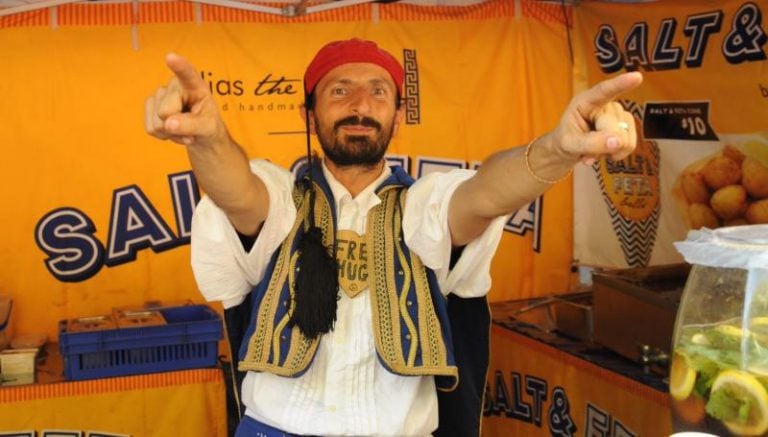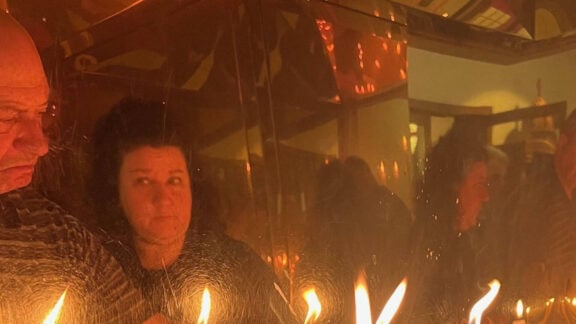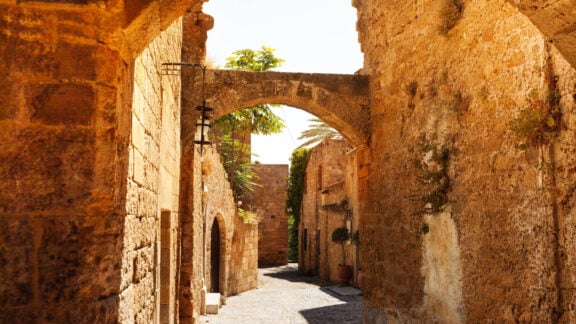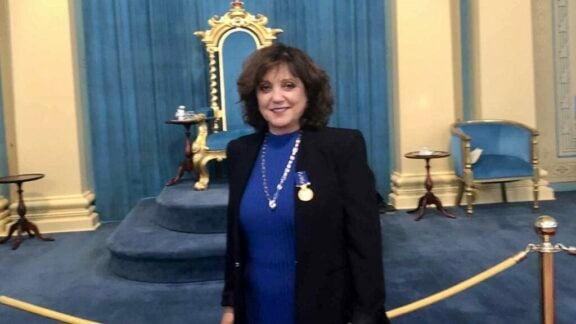The post-it note reads: “The Durrells – Channel 7 – Thursdays – Good Family Show.”
It’s attached on a pathology slip that I unearthed, while trying to tidy up my desk. It was written by the kind, cheerful woman who had – kindly, cheerfully – drawn blood from my veins, for my regular check-up. Reading it made me smile – well, not as much as the blood test results, but still. I remembered our discussion and her suggesting I should watch the british show, about the great writer Gerald Durrell and his life in Corfu. It came at the end of a discussion where she shared her love of Greece and more particularly, for the stuffed tomatoes she was often having for lunch at the local eatery (local, of course, being Oakleigh).
This, in its turn, reminded me of a complaint a friend was making, that anytime she’s around non-Greeks, discussion always ends up being about food. She thought it was a sign of shallowness. I, on the other hand, am relieved that my recent encounters with non-Greeks (am I allowed to say ‘Anglo’?) people are becoming more food-centric. When I first came in Melbourne, three years ago, anyone who met me tilted their heads a bit, gave me a worrisome, philanthropic look and said something about the economy. “I’ve seen the news, it’s terrible what’s happening, isn’t it?”

It is. I may have spent hours going over and over the same stories, trying to navigate people through “the Greek issue,” explaining what it means to be PASOK, what the European Regional Development Funds are, the strong ties between the Common Agricultural Policy and bouzoukia, pensions, benefits, trying to set up business in Greece, corruption, taxation, neoliberalism and Varoufakis. I’d much rather discuss stuffed tomatoes and charcoal-grilled meat, share the delight of having an after-hours $13.5 fish soup at ‘Stalaktites’ and enter the ongoing debate on whether ‘Kalimera’ serves the best souvlaki in Melbourne.
The city is still trying to digest the wildly successful 31st Lonsdale Street Festival which saw Melbourne’s CBD engulfed in barbecue smoke and the smell of food being cooked in gigantic quantity and frantic pace. It is fair to say that anyone who visited the area last weekend still has an aftertaste of gyros, spanakopita and loukoumades all mixed together. In fact, souvlaki consumption is one of the Festival’s measure of success – this year it is estimated that more than 20,000 of them were sold. That’s a lot of souvas. It’s easy to be mistaken and think that the Festival is all about food. The stalls can do that for you, forming a pathway for foodies, offering everything, from your basic – and basically non-Greek – Fish and chips, to the former-novelty-turned-festival-staple of potato twists, to Greek delicacies having made the 15,000 km trip from the motherland, to eye-and-mouth watering dishes made with love of the produce and a fresh approach to tradition, like the ones that Angie Giannakodakis was serving at the Elyros stand. Greeks take all that for granted. Critics would want it to be more about the culture and less about the food. I know, I’ve been one of them.

As much as I appreciate a shot of raki before lunchtime – or an ice-cold coffee at midnight, for that matter – I have found myself trying to cut through the smog of burnt meat, hoping that this Greek celebration would be more about language, high-brow culture and the theatre.
Of course, I was wrong. Yes, there are much more to be done to further pursue a high-level of teaching Greek and yes, there are always more to be done to promote Greek culture through music, literature, theatre. And an open debate about how the Community allocates the generous funding pledged by the Andrews government is certainly worth having. There is a time and place for that and that time and place is not on Sunday afternoon at Lonsdale Street, among people filling their stomachs with food. However hungry one might be for spiritual nourishment, it’s never okay to be a party spoiler – I found out the hard way.

Instead, I learnt to relax, and try to see things through the eyes – and tastebuds – of people for whom Greek food is not part of their upbringing, people like the kind, cheerful nurse sticking a needle in my arm trying to find out my cholesterol levels. They are happy to partake of what we’ve been cooking for ages and express their delight.
A large part of that 20,000 souvas were consumed by non-Greeks and it is important to keep that in mind. It’s very easy to dismiss food as a component of culture, but there’s a reason that SBS has devoted a channel to cooking shows and food content. It is the common denominator, what brings us together. As Greeks, we know what a real symposium is all about. So let’s break bread and see this as the start of a real conversation. We still might end up fighting about Varoufakis. But at least we’ll not be hungry.








